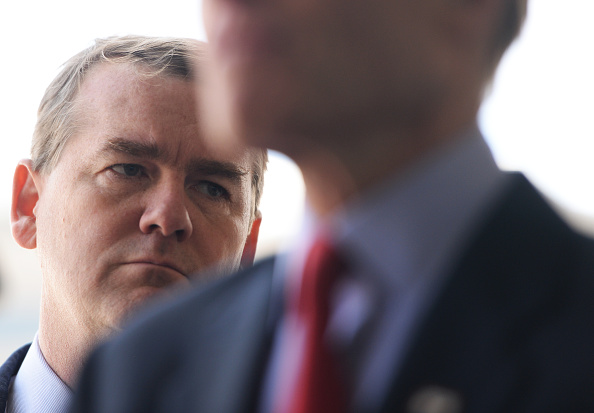
Sen. Michael Bennet, former leader of the Democratic Party’s Senate campaign arm, is sponsoring a bill that would make his successor’s job even harder.
Under Bennet’s leadership, the Democratic Senatorial Campaign Committee accumulated nearly three times as much “bundled” money from lobbyists than its counterpart, the National Republican Senatorial Committee, according to a Center for Public Integrity analysis of federal campaign finance filings.
The DSCC reported raising roughly $4.3 million from lobbyist-bundlers during 2013 and 2014, compared to $1.5 million reported by the NRSC.
But Bennet’s bill would severely limit high-octane lobbyists’ ability to “bundle” campaign contributions — the act of raising money from people and delivering it to campaigns in one bundle. It’s a move that could further handicap his party’s effort at next year winning back a Senate majority — and has invited cries of hypocrisy from Republicans.
Matt Connelly, a spokesman for the NRSC, said the legislation shows Bennet “says one thing and has done another on the issue.” Connelly declined to comment on the substance of Bennet’s bill.
Sadie Weiner, the DSCC’s national press secretary, declined to comment on Bennet’s proposal. The office of Sen. Jon Tester, D-Mont., who now leads the DSCC, did not respond to a question about whether the DSCC will continue to accept unlimited money from lobbyist-bundlers.
Asked whether Bennet, a Colorado Democrat, would personally continue to accept contributions bundled by lobbyists, Bennet spokesman Adam Bozzi said the senator wishes campaign finance rules were different and is fighting for reforms, but “until then he will continue to abide by the rules.”
In an emailed statement, Bennet himself said members of Congress’s attention has for too long “been distorted toward lobbyists and special interests, rather than the people who elected them and they represent … we can take significant steps to returning the power to the American people by preventing members of Congress from chasing down tens of thousands of dollars from lobbyists while they should be doing their jobs.”
Already, lobbyists who raise above a certain threshold must be identified by campaigns on reports filed with the Federal Election Commission. Bundlers who are not lobbyists are not required to be publicly disclosed.
Bennet’s legislation would require lobbyists to count money they raise from other people against their own personal contribution limits, which vary for different kinds of political committees.
For example, a lobbyist could only bundle up to $2,700 for a single federal candidate per election.
Beyond restricting how much money lobbyists may bundle, Bennet’s bill would also prohibit members of Congress and candidates from soliciting contributions from registered lobbyists while Congress is in session. It would furthermore force more people to register as lobbyists by eliminating certain regulatory thresholds.
Bennet, who faces re-election in 2016, introduced similar legislation during the 113th Congress, but it failed to even reach the Senate floor for a vote.
Several groups that promote campaign finance and lobbying reform, including Democracy 21, the Campaign Legal Center and the League of Women Voters, have endorsed the bill.
But the legislation’s prospects are equally dim this time around, Bennet and others acknowledged. A divided Congress has been unable to pass almost any campaign finance or ethics bills of late.
Craig Holman, a lobbyist for Public Citizen, which advocates for campaign finance and lobbying reform, said he expects the 2016 elections to be the “ messiest federal election that we’ve ever seen,” which could spark new calls for reform.
“Hopefully, some action will come of it later,” Holman said.
At least some lobbyists wouldn’t mind if the bill passed.
“I’m in favor of banning not just lobbyist bundling but lobbyist contributions” said Tony Podesta, the founder of lobbying firm the Podesta Group.
Podesta, a high-profile Democratic donor whose dozens of clients include Google, T-Mobile and Wal-Mart, bundled nearly half a million dollars for the DSCC during the 2014 election cycle. That’s more than any other single lobbyist bundled for the committee.
Asked about the legislation’s odds of passing, Podesta wryly nodded at lawmakers’ historic reluctance to pass legislation limiting their own ability to raise money.
“I would say they are 2,700 to one.”
The Center for Public Integrity is a nonprofit investigative news organization based in Washington, D.C. For more political investigations, go here, or follow the Center for Public Integrity on Twitter.
More Must-Reads from TIME
- Cybersecurity Experts Are Sounding the Alarm on DOGE
- Meet the 2025 Women of the Year
- The Harsh Truth About Disability Inclusion
- Why Do More Young Adults Have Cancer?
- Colman Domingo Leads With Radical Love
- How to Get Better at Doing Things Alone
- Michelle Zauner Stares Down the Darkness
Contact us at letters@time.com